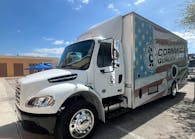A former co-worker of mine has a daughter who was a high school team swimmer. After a less-than-desirable swim meet, she asked her dad, “How do I win more races?” After some consideration, my co-worker’s suggestion was right to the point: “Swim faster.”
A mobile jobber says to their spouse, “How do I make more money?” After some thoughtful consideration the spouse’s suggestion is also right to the point: “Close more sales.”
If only the answers to complex problems were that simple: swim faster, close more sales.
Since I swim like a stone, we will not be talking about swimming. This month we are going to look into a way for you to close sales more often and more easily.
There is an old sales axiom that says, “ABC – always be closing.” Then there is the newer philosophy of “Find a need, fill the need, and the customers will come to you.” The newest style of selling is not to sell the product at all; simply help the customer understand what the product will do for them. All styles of selling will work if you do it well, but at the end of any sales presentation you have to ask the prospect if they want the product.
As a professional mobile jobber, you are fortunate that all your customers actually need the products you are selling to make their living. You’re not selling a product that no one really needs, like a timeshare. There is no closing room for you to corner your prospect in and beat on them until they give in and buy something.
The last thing you want to be is the salesperson who gets someone interested in the product, shows them all the features, advantages, and benefits, and then never asks the question: Would you like one? This leaves the competition open to walk in the door and get the order.
Customers normally buy in three stages. First, they buy into the salesperson. Do they want to do business with you? Are you likeable, do you seem honest, do you know your stuff, and have they heard good things about you?
Second, they buy your company. Does your brand have a good reputation? Does your company stand behind their products with a good warranty? Does your company offer the new cool products? Has the customer seen your company’s advertisements in magazines? Are your company’s mobile jobbers happy with the company?
Finally, they buy the product. Is this what they want? Will it fill their needs? Is it priced right? Is there something better on the market? Can they afford it? What will their co-workers think of them buying this product?
So, let’s get into it.
We have talked in previous issues of Professional Distributor about trial closing as you make your presentation.
“How do you like it so far?” “Do you think this will fit your needs?” “Is this the color you like?”
These little innocent “trial closes” give you a good way to get a feel for how much your customer likes the product, making it much easier to ask for the order at the right time.
Watch for what are called “closing signals” given off by your prospect. As soon as they use the term “mine,” it is time to ask for the order.
“Will mine come with that feature?” “Will mine be shipped to me or will you drop it off?” “Can I get mine in red?”
Now it is time to ask for the order using the word “yours.”
“Since that feature is important to you, we will order it with yours. Is delivery next week okay?” “I can bring yours here next week, is Tuesday okay for you?” “That is a great color choice, I will order yours in red.”
These are all easy, simple, smooth, and non-threatening ways to ask for an order.
Another closing approach that works well is the “either, or, and both” close.
“Do you want the screwdriver set, the nut drivers set, or both?” “Do you want the SAE socket set, the metric set, or both?”
The “get on the bandwagon” close will work with a prospect who you know is easily swayed by the opinion of others.
“All the technicians over at XYZ Repair are using this tool, I think you will like it too.” “I’m sure you’re tired of borrowing this tool from you co-workers. Would you like one of your own?”
In the automotive repair business, the “application close” is another useful and non-pressure approach.
“You know how hard it is and how much time it takes when you’re fixing the (insert application here)? This new tool will make that repair go quickly and easily. Will you want one?”
When your customer contacts you for information on something, a great selling technique is the assumptive close. For example, when a customer calls you for information about a storage unit, assume the sale is yours.
“Thanks for calling me in on getting you a new cabinet. Let’s sit down and write the order to meet your needs.” “Thanks for calling me to get your new XYZ. When should we schedule delivery?”
When it comes right down to it, closing the sale or asking for the order should be a simple, smooth process and fit naturally into the end of your presentation. Whether you use the “feature, advantage, benefit” style of selling, the “find a need” philosophy, or any other approach, at the end of the day you must ask the customer to buy something.
The most important pointer I can give you is what to say after you ask for the order.
Say nothing. When you ask your closing question, be quiet. Don’t fidget, don’t move around, just sit or stand there quietly. It may seem like an eternity and it might take a minute or two depending on the size of the sale. Give your customer all the time they need to decide. Interrupting their thoughts by adding some additional thoughts will not help and could kill the sale.
As a mobile jobber, you are likely good at keeping conversation flowing and making customers feel at ease, so staying quiet may feel odd or uncomfortable. But try it out and you may find you have more success using this tactic than you expect.
Now, go sell something!



